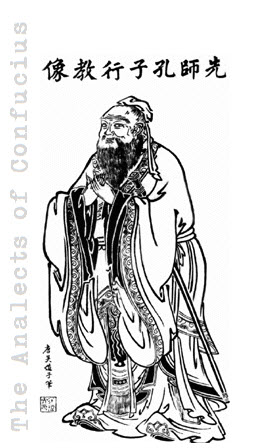Find the complete text of the Analects of Confucius.
BOOK IV
Social Virtue—Superior and Inferior Man
Sayings of the Master:—
"It is social good feeling that gives charm to a neighborhood. And where is the wisdom of those who choose an abode where it does not abide?
"Those who are without it cannot abide long, either in straitened or in happy circumstances. Those who possess it find contentment in it. Those who are wise go after it as men go after gain.
"Only they in whom it exists can have right likings and dislikings for others.
"Where the will is set upon it, there will be no room for malpractices.
"Riches and honor are what men desire; but if they arrive at them by improper ways, they should not continue to hold them. Poverty and low estate are what men dislike; but if they arrive at such a condition by improper ways, they should not refuse it.
"If the 'superior man' make nought of social good feeling, how shall he fully bear that name?
"Not even whilst he eats his meal will the 'superior man' forget what he owes to his fellow-men. Even in hurried leave-takings, even in moments of frantic confusion, he keeps true to this virtue.
"I have not yet seen a lover of philanthropy, nor a hater of misanthropy—such, that the former did not take occasion to magnify that virtue in himself, and that the latter, in his positive practice of philanthropy, did not, at times, allow in his presence something savoring of misanthropy.
"Say you, is there any one who is able for one whole day to apply the energy of his mind to this virtue? Well, I have not seen any one whose energy was not equal to it. It may be there are such, but I have never met with them.
"The faults of individuals are peculiar to their particular class and surroundings; and it is by observing their faults that one comes to understand the condition of their good feelings towards their fellows.
"One may hear the right way in the morning, and at evening die.
"The scholar who is intent upon learning the right way, and who is yet ashamed of poor attire and poor food, is not worthy of being discoursed with.
"The masterly man's attitude to the world is not exclusively this or that: whatsoever is right, to that he will be a party.
"The masterly man has an eye to virtue, the common man, to earthly things; the former has an eye to penalties for error—the latter, to favor.
"Where there is habitual going after gain, there is much ill-will.
"When there is ability in a ruler to govern a country by adhering to the
Rules of Propriety, and by kindly condescension, what is wanted more?
Where the ability to govern thus is wanting, what has such a ruler to do
with the Rules of Propriety?
"One should not be greatly concerned at not being in office; but rather about the requirements in one's self for such a standing. Neither should one be so much concerned at being unknown; but rather with seeking to become worthy of being known."
Addressing his disciple Tsang Sin, the Master said, "Tsang Sin, the principles which I inculcate have one main idea upon which they all hang." "Aye, surely," he replied.
When the Master was gone out the other disciples asked what was the purport of this remark. Tsang's answer was, "The principles of our Master's teaching are these—whole-heartedness and kindly forbearance; these and nothing more."
Other observations of the Master:—
"Men of loftier mind manifest themselves in their equitable dealings; small-minded men in their going after gain.
"When you meet with men of worth, think how you may attain to their level; when you see others of an opposite character, look within, and examine yourself.
"A son, in ministering to his parents, may (on occasion) offer gentle remonstrances; when he sees that their will is not to heed such, he should nevertheless still continue to show them reverent respect, never obstinacy; and if he have to suffer, let him do so without murmuring.
"Whilst the parents are still living, he should not wander far; or, if a wanderer, he should at least have some fixed address.
"If for three years he do not veer from the principles of his father, he may be called a dutiful son.
"A son should not ignore the years of his parents. On the one hand, they may be a matter for rejoicing (that they have been so many), and on the other, for apprehension (that so few remain).
"People in olden times were loth to speak out, fearing the disgrace of not being themselves as good as their words.
"Those who keep within restraints are seldom losers.
"To be slow to speak, but prompt to act, is the desire of the 'superior man.'
"Virtue dwells not alone: she must have neighbors."
An observation of Tsz-yu:— "Officiousness, in the service of princes, leads to disgrace: among friends, to estrangement."
|
|

